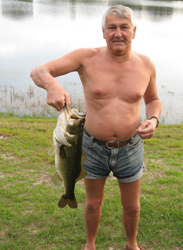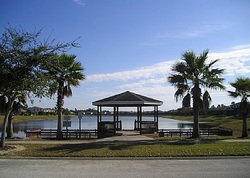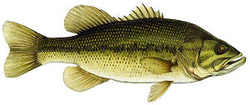Fishing in Florida

Fishing in Florida Orlando, Florida is best known for Disney World, Sea World, and the Universal Orlando Resorts. But did you know that Florida is also known as the Bass fishing capital of the world? Plus there are over 250 different species of freshwater fish that can be found in Florida's lakes and rivers.
Many anglers who have toured the world in search of the perfect fishing have almost always ended up coming to rest in Orlando because of the consistence of the waters, the great amounts of beautiful bass, and the wondrous scenery coupled with great places to drop off the kids whilst you look for that gorgeous, incredible bass to tip the scales.
With literally thousands of terrific fishing spots in Florida to choose from.
Here are a few of the best:
The Great Kissimmee Chain of lakes, Lake Toho, Lake Cypress and Lake Hatchinea are world famous lakes for having produced big Bass the year round. This chain is around a 20-minute drive journey from the International drive area.
The Great Butler Chain of lakes can be found in and around the town of Windermere just minutes away from the theme parks offer excellent Bass fishing in clean waters with holes up to almost 40 feet deep.
The Clermont Chain is another great Bass fishery with tanic water and cypress trees ringing the great lakes with a river connection to the other lakes in the chain. 10lb plus are caught yearly but you can catch 15 to 25lb Bass.
Lake Kissimmee. Actually part of a chain of lakes, in Polk and Osceola counties, Lake Kissimmee is 35,000 acres. Also known for great fishing is West Lake Tohopekaliga, an 18,810-acre shallow lake just south of the city of Kissimmee, can be accessed by passing through the locks between the lakes.
Lake Okeechobee. Probably Florida's most famous bass fishing location, Lake Okeechobee (the "Big O") is located in south central Florida, covering 730 square miles, easily accessible from both the east and west coast of Florida. The best spots are around Eagle Bay Island, Fish eating Bay, and Pelican Bay
Many anglers who have toured the world in search of the perfect fishing have almost always ended up coming to rest in Orlando because of the consistence of the waters, the great amounts of beautiful bass, and the wondrous scenery coupled with great places to drop off the kids whilst you look for that gorgeous, incredible bass to tip the scales.
With literally thousands of terrific fishing spots in Florida to choose from.
Here are a few of the best:
The Great Kissimmee Chain of lakes, Lake Toho, Lake Cypress and Lake Hatchinea are world famous lakes for having produced big Bass the year round. This chain is around a 20-minute drive journey from the International drive area.
The Great Butler Chain of lakes can be found in and around the town of Windermere just minutes away from the theme parks offer excellent Bass fishing in clean waters with holes up to almost 40 feet deep.
The Clermont Chain is another great Bass fishery with tanic water and cypress trees ringing the great lakes with a river connection to the other lakes in the chain. 10lb plus are caught yearly but you can catch 15 to 25lb Bass.
Lake Kissimmee. Actually part of a chain of lakes, in Polk and Osceola counties, Lake Kissimmee is 35,000 acres. Also known for great fishing is West Lake Tohopekaliga, an 18,810-acre shallow lake just south of the city of Kissimmee, can be accessed by passing through the locks between the lakes.
Lake Okeechobee. Probably Florida's most famous bass fishing location, Lake Okeechobee (the "Big O") is located in south central Florida, covering 730 square miles, easily accessible from both the east and west coast of Florida. The best spots are around Eagle Bay Island, Fish eating Bay, and Pelican Bay
Sunset Lakes

Fishing is allowed on either of our 2 lakes (te larger lake has a fishing pier complete with seating and pretty cabana), which are stocked with Wide Mouth Bass and Chinese Grass Carp. You may even catch the odd turtle. Please note that a catch and release scheme is operated on Sunset Lakes, and that whilst you are a visitor staying on the estate you are not required to purchase any fishing permits.
Wide mouth bass

Habitat: Prefers clear, non-flowing waters with aquatic vegetation where food and cover are available. They occupy brackish to freshwater habitats, including upper estuaries, rivers, lakes, reservoirs and ponds. Also, they can tolerate a wide range of water clarities and bottom types, prefer water temperatures from 65 to 85 degrees, and are usually found at depths less than 20 feet.
Description:The largemouth is the largest member of the sunfish family. It generally has light greenish to brownish sides with a dark lateral line, which tends to break into blotches towards the tail; it is easily distinguishable because the upper jaw extends beyond the rear edge of the eye. Also, its first and second dorsal fins are almost separated by an obvious deep dip, and there are no scales on the soft-rayed second dorsal fin or on the anal fin.
Florida Record: 17 pounds, 4 and 1/4 ounces, caught in an unnamed lake in Polk County in 1986.
Game Qualities: The largemouth bass is Florida's most popular freshwater game fish. Much of its popularity is due to its aggressive attitude and willingness to strike a lure or bait with explosive force. The value of the largemouth as a sport fish has prompted a movement toward catch-and-release fishing.
Tackle and Baits: Light casting and spinning tackle is adequate in most instances. When fishing heavy cover you may want to use line from 12 to 25 pounds depending on the structure. They will strike almost any kind of artificial lure or live bait, but most are taken on plastic worms, surface plugs, spinner baits, crank baits. For Trophy size Largemouth, most are caught using Large Wild Shiners.
Description:The largemouth is the largest member of the sunfish family. It generally has light greenish to brownish sides with a dark lateral line, which tends to break into blotches towards the tail; it is easily distinguishable because the upper jaw extends beyond the rear edge of the eye. Also, its first and second dorsal fins are almost separated by an obvious deep dip, and there are no scales on the soft-rayed second dorsal fin or on the anal fin.
Florida Record: 17 pounds, 4 and 1/4 ounces, caught in an unnamed lake in Polk County in 1986.
Game Qualities: The largemouth bass is Florida's most popular freshwater game fish. Much of its popularity is due to its aggressive attitude and willingness to strike a lure or bait with explosive force. The value of the largemouth as a sport fish has prompted a movement toward catch-and-release fishing.
Tackle and Baits: Light casting and spinning tackle is adequate in most instances. When fishing heavy cover you may want to use line from 12 to 25 pounds depending on the structure. They will strike almost any kind of artificial lure or live bait, but most are taken on plastic worms, surface plugs, spinner baits, crank baits. For Trophy size Largemouth, most are caught using Large Wild Shiners.
Chinese grass carp

Description: Most people are surprised to learn that grass carp are members of the minnow family, as they certainly don't fit the typical minnow profile; these fish grow to an average of 15-20 pounds and 20-35 inches in length. In larger lakes, with plenty of plants to eat, they can grow up to 50-60 pounds and exceed 50 inches in length. Chinese grass carp sometimes appear silver in colour, but often display an olive green or dark grey hue on top with light gold or pale yellow sides. Their belly is silvery or bluish-white and fins are light green or grey. Unusually large fish scales are another distinguishing characteristic.
Florida Record: The largest reported grass carp weighed a hefty 75 pounds. Minnow, indeed!
Game Qualities: Chinese grass carp were originally imported and stocked into Florida lakes in 1972 as part of an experimental effort to control hydrilla. When stocked in high enough numbers, the fish proved to be extremely effective plant harvesters. However, lake managers and biologists were also in for a few surprises: when attempts were made to remove the fish from the lake, they were amazed at the carp's uncanny ability to outsmart virtually every type of fishing technique. Nets, hook-and-line, electro-shocking, even poison baits were minimally successful, especially after the first application. It soon became apparent that once released, grass carp were nearly impossible to remove, there are still no easy ways to remove grass carp from a stocked lake.
Tackle and Baits: When faced with hundreds of unwanted grass carp in Lake McMeekin back in 1990, one individual took it upon himself to try and remove them one at a time, using hook and line. He started each fishing session by tossing soybean chum out into the water just off his dock. He then used moulded dough balls made from Hungry Jack biscuit mix (uncooked). Using this technique, the angler and his neighbours reportedly caught more than 600 grass carp!
Chinese grass carp are not always selective about the plants they eat; they may start with their favourite plants, but once those are consumed, grass carp have been known to eat every single plant in a water body - including submersed, immersed, and floating plants. They've even been seen wriggling out of the water to eat grasses along the shoreline!
Grass carp can live for 10 years or more. The older they are, the larger they become and the more food they will consume.
Florida Record: The largest reported grass carp weighed a hefty 75 pounds. Minnow, indeed!
Game Qualities: Chinese grass carp were originally imported and stocked into Florida lakes in 1972 as part of an experimental effort to control hydrilla. When stocked in high enough numbers, the fish proved to be extremely effective plant harvesters. However, lake managers and biologists were also in for a few surprises: when attempts were made to remove the fish from the lake, they were amazed at the carp's uncanny ability to outsmart virtually every type of fishing technique. Nets, hook-and-line, electro-shocking, even poison baits were minimally successful, especially after the first application. It soon became apparent that once released, grass carp were nearly impossible to remove, there are still no easy ways to remove grass carp from a stocked lake.
Tackle and Baits: When faced with hundreds of unwanted grass carp in Lake McMeekin back in 1990, one individual took it upon himself to try and remove them one at a time, using hook and line. He started each fishing session by tossing soybean chum out into the water just off his dock. He then used moulded dough balls made from Hungry Jack biscuit mix (uncooked). Using this technique, the angler and his neighbours reportedly caught more than 600 grass carp!
Chinese grass carp are not always selective about the plants they eat; they may start with their favourite plants, but once those are consumed, grass carp have been known to eat every single plant in a water body - including submersed, immersed, and floating plants. They've even been seen wriggling out of the water to eat grasses along the shoreline!
Grass carp can live for 10 years or more. The older they are, the larger they become and the more food they will consume.
You do not need a license to fish in the lakes at Sunset!
However you must catch and return to the lake
If you want to use any of the other lakes in the Kissimmee or any other Florida area you will need a license
Where can I get a license? For added convenience, many bait-and-tackle shops and sports retailers (e.g., Wal-Mart, K-Mart, and Sports Authority) sell licenses, for a small additional fee. Instant licenses are also available via the Internet or a toll free call to credit card users, for an additional convenience fee.
Do I need a freshwater or saltwater fishing license or both? In general, you need a freshwater license to take freshwater fish and a saltwater license to take saltwater fish. Obviously if you are fishing in pure fresh water where no saltwater species live, you need a freshwater license and likewise if you are fishing in the ocean you need a saltwater license. However, when you get into estuarine type areas where salt and fresh water commingle and fish of both types can be found the issue becomes less clear.
Non-resident Freshwater Fishing License fees:
3-Day Freshwater Fishing (Valid three days from specified beginning date) $17.00
7-Day Freshwater Fishing (Valid seven days from specified beginning date) $30.00
1 Year Freshwater Fishing (Valid for 1 Year from specified beginning date) $47.00
